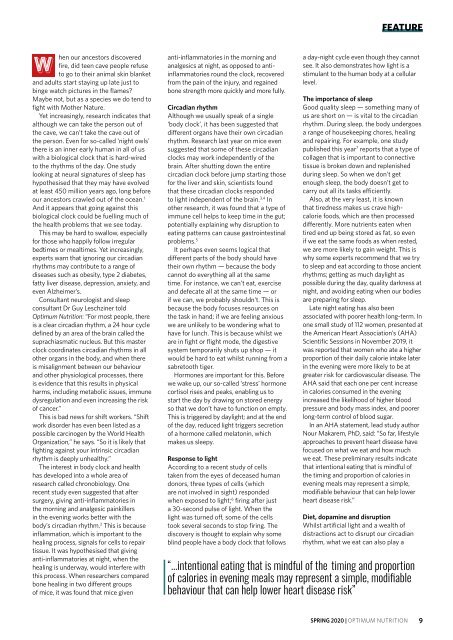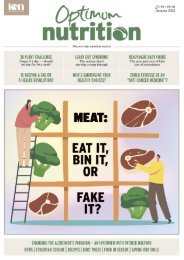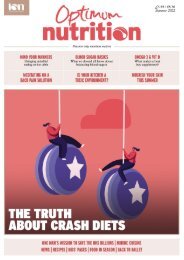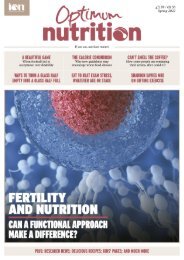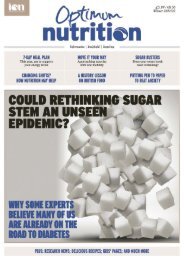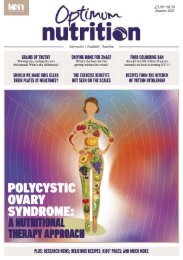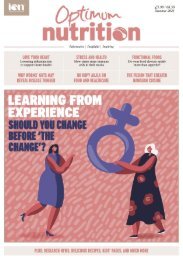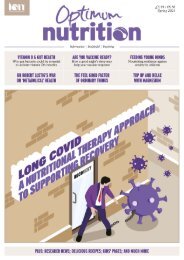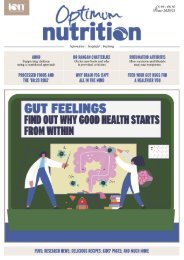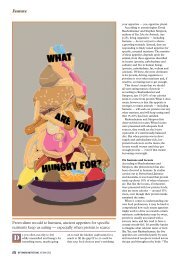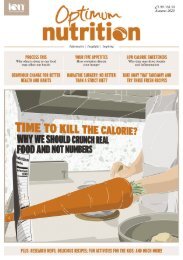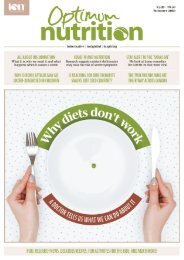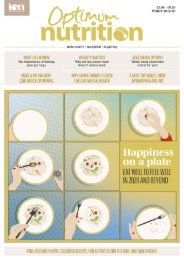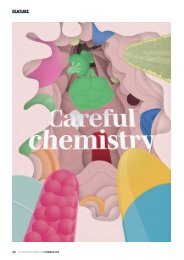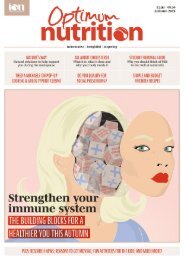Optimum Nutrition - Spring 2020 PREVIEW
Why your circadian rhythm is important for health and wellbeing | Age well to live well - what everyone over 40 (and younger) should know | The doctor who says our world is making us sick | Why junk food could be making your allergies worse | Making the most out of frozen fruit and veg | Could faecal transplants treat disease in the future? | Cannabidiol - should we say high to this new craze? | Plus kids' pages, recipes and more!
Why your circadian rhythm is important for health and wellbeing | Age well to live well - what everyone over 40 (and younger) should know | The doctor who says our world is making us sick | Why junk food could be making your allergies worse | Making the most out of frozen fruit and veg | Could faecal transplants treat disease in the future? | Cannabidiol - should we say high to this new craze? | Plus kids' pages, recipes and more!
Create successful ePaper yourself
Turn your PDF publications into a flip-book with our unique Google optimized e-Paper software.
FEATURE<br />
W<br />
hen our ancestors discovered<br />
fire, did teen cave people refuse<br />
to go to their animal skin blanket<br />
and adults start staying up late just to<br />
binge watch pictures in the flames?<br />
Maybe not, but as a species we do tend to<br />
fight with Mother Nature.<br />
Yet increasingly, research indicates that<br />
although we can take the person out of<br />
the cave, we can’t take the cave out of<br />
the person. Even for so-called ‘night owls’<br />
there is an inner early human in all of us<br />
with a biological clock that is hard-wired<br />
to the rhythms of the day. One study<br />
looking at neural signatures of sleep has<br />
hypothesised that they may have evolved<br />
at least 450 million years ago, long before<br />
our ancestors crawled out of the ocean. 1<br />
And it appears that going against this<br />
biological clock could be fuelling much of<br />
the health problems that we see today.<br />
This may be hard to swallow, especially<br />
for those who happily follow irregular<br />
bedtimes or mealtimes. Yet increasingly,<br />
experts warn that ignoring our circadian<br />
rhythms may contribute to a range of<br />
diseases such as obesity, type 2 diabetes,<br />
fatty liver disease, depression, anxiety, and<br />
even Alzheimer’s.<br />
Consultant neurologist and sleep<br />
consultant Dr Guy Leschziner told<br />
<strong>Optimum</strong> <strong>Nutrition</strong>: “For most people, there<br />
is a clear circadian rhythm, a 24 hour cycle<br />
defined by an area of the brain called the<br />
suprachiasmatic nucleus. But this master<br />
clock coordinates circadian rhythms in all<br />
other organs in the body, and when there<br />
is misalignment between our behaviour<br />
and other physiological processes, there<br />
is evidence that this results in physical<br />
harms, including metabolic issues, immune<br />
dysregulation and even increasing the risk<br />
of cancer.”<br />
This is bad news for shift workers. “Shift<br />
work disorder has even been listed as a<br />
possible carcinogen by the World Health<br />
Organization,” he says. “So it is likely that<br />
fighting against your intrinsic circadian<br />
rhythm is deeply unhealthy.”<br />
The interest in body clock and health<br />
has developed into a whole area of<br />
research called chronobiology. One<br />
recent study even suggested that after<br />
surgery, giving anti-inflammatories in<br />
the morning and analgesic painkillers<br />
in the evening works better with the<br />
body’s circadian rhythm. 2 This is because<br />
inflammation, which is important to the<br />
healing process, signals for cells to repair<br />
tissue. It was hypothesised that giving<br />
anti-inflammatories at night, when the<br />
healing is underway, would interfere with<br />
this process. When researchers compared<br />
bone healing in two different groups<br />
of mice, it was found that mice given<br />
anti-inflammatories in the morning and<br />
analgesics at night, as opposed to antiinflammatories<br />
round the clock, recovered<br />
from the pain of the injury, and regained<br />
bone strength more quickly and more fully.<br />
Circadian rhythm<br />
Although we usually speak of a single<br />
‘body clock’, it has been suggested that<br />
different organs have their own circadian<br />
rhythm. Research last year on mice even<br />
suggested that some of these circadian<br />
clocks may work independently of the<br />
brain. After shutting down the entire<br />
circadian clock before jump starting those<br />
for the liver and skin, scientists found<br />
that these circadian clocks responded<br />
to light independent of the brain. 3,4 In<br />
other research, it was found that a type of<br />
immune cell helps to keep time in the gut;<br />
potentially explaining why disruption to<br />
eating patterns can cause gastrointestinal<br />
problems. 5<br />
It perhaps even seems logical that<br />
different parts of the body should have<br />
their own rhythm — because the body<br />
cannot do everything all at the same<br />
time. For instance, we can’t eat, exercise<br />
and defecate all at the same time — or<br />
if we can, we probably shouldn’t. This is<br />
because the body focuses resources on<br />
the task in hand; if we are feeling anxious<br />
we are unlikely to be wondering what to<br />
have for lunch. This is because whilst we<br />
are in fight or flight mode, the digestive<br />
system temporarily shuts up shop — it<br />
would be hard to eat whilst running from a<br />
sabretooth tiger.<br />
Hormones are important for this. Before<br />
we wake up, our so-called ‘stress’ hormone<br />
cortisol rises and peaks, enabling us to<br />
start the day by drawing on stored energy<br />
so that we don’t have to function on empty.<br />
This is triggered by daylight; and at the end<br />
of the day, reduced light triggers secretion<br />
of a hormone called melatonin, which<br />
makes us sleepy.<br />
Response to light<br />
According to a recent study of cells<br />
taken from the eyes of deceased human<br />
donors, three types of cells (which<br />
are not involved in sight) responded<br />
when exposed to light; 6 firing after just<br />
a 30-second pulse of light. When the<br />
light was turned off, some of the cells<br />
took several seconds to stop firing. The<br />
discovery is thought to explain why some<br />
blind people have a body clock that follows<br />
a day-night cycle even though they cannot<br />
see. It also demonstrates how light is a<br />
stimulant to the human body at a cellular<br />
level.<br />
The importance of sleep<br />
Good quality sleep — something many of<br />
us are short on — is vital to the circadian<br />
rhythm. During sleep, the body undergoes<br />
a range of housekeeping chores, healing<br />
and repairing. For example, one study<br />
published this year 7 reports that a type of<br />
collagen that is important to connective<br />
tissue is broken down and replenished<br />
during sleep. So when we don’t get<br />
enough sleep, the body doesn’t get to<br />
carry out all its tasks efficiently.<br />
Also, at the very least, it is known<br />
that tiredness makes us crave highcalorie<br />
foods, which are then processed<br />
differently. More nutrients eaten when<br />
tired end up being stored as fat, so even<br />
if we eat the same foods as when rested,<br />
we are more likely to gain weight. This is<br />
why some experts recommend that we try<br />
to sleep and eat according to those ancient<br />
rhythms; getting as much daylight as<br />
possible during the day, quality darkness at<br />
night, and avoiding eating when our bodies<br />
are preparing for sleep.<br />
Late night eating has also been<br />
associated with poorer health long-term. In<br />
one small study of 112 women, presented at<br />
the American Heart Association’s (AHA)<br />
Scientific Sessions in November 2019, it<br />
was reported that women who ate a higher<br />
proportion of their daily calorie intake later<br />
in the evening were more likely to be at<br />
greater risk for cardiovascular disease. The<br />
AHA said that each one per cent increase<br />
in calories consumed in the evening<br />
increased the likelihood of higher blood<br />
pressure and body mass index, and poorer<br />
long-term control of blood sugar.<br />
In an AHA statement, lead study author<br />
Nour Makarem, PhD, said: “So far, lifestyle<br />
approaches to prevent heart disease have<br />
focused on what we eat and how much<br />
we eat. These preliminary results indicate<br />
that intentional eating that is mindful of<br />
the timing and proportion of calories in<br />
evening meals may represent a simple,<br />
modifiable behaviour that can help lower<br />
heart disease risk.”<br />
Diet, dopamine and disruption<br />
Whilst artificial light and a wealth of<br />
distractions act to disrupt our circadian<br />
rhythm, what we eat can also play a<br />
“...intentional eating that is mindful of the timing and proportion<br />
of calories in evening meals may represent a simple, modifiable<br />
behaviour that can help lower heart disease risk”<br />
SPRING <strong>2020</strong> | OPTIMUM NUTRITION<br />
9


